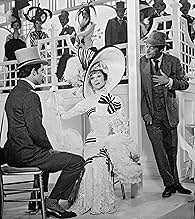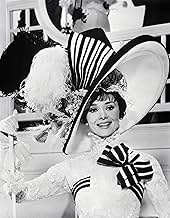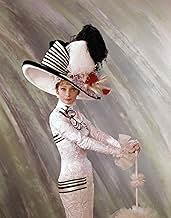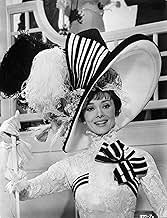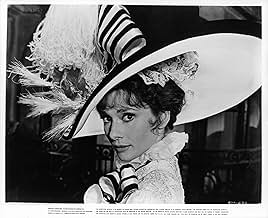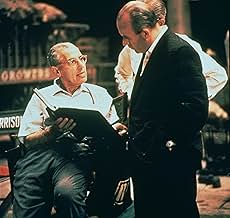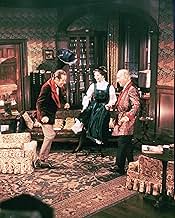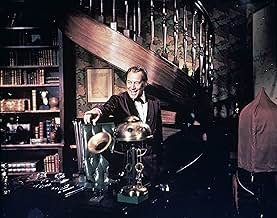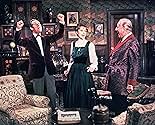My Fair Lady
- 1964
- Tous publics
- 2h 50min
Un professeur de phonétique misogyne et snob accepte le pari de transformer une vendeuse de fleurs et la rendre présentable dans la haute société.Un professeur de phonétique misogyne et snob accepte le pari de transformer une vendeuse de fleurs et la rendre présentable dans la haute société.Un professeur de phonétique misogyne et snob accepte le pari de transformer une vendeuse de fleurs et la rendre présentable dans la haute société.
- Réalisation
- Scénario
- Casting principal
- Récompensé par 8 Oscars
- 26 victoires et 13 nominations au total
David Ahdar
- Ball Guest
- (non crédité)
- …
Elizabeth Aimers
- Cockney
- (non crédité)
Helen Albrecht
- Ascot Extra
- (non crédité)
John Alderson
- Jamie - Doolittle's crony
- (non crédité)
Mary Alexander
- Cockney
- (non crédité)
Gertrude Astor
- Cockney
- (non crédité)
LaWana Backer
- Ad Lib at Church
- (non crédité)
Walter Bacon
- Ball Guest
- (non crédité)
Avis à la une
I first saw this film when I was eight years old, after receiving it as a first communion present from my mother. For months I watched the movie on an almost daily basis, and it was quickly a favorite. I thought it was absolute perfection.
Now that I am a bit older.. I notice that is does have quite a few flaws. It doesn't really capture the essence of Shaw's Pygmalion, but I don't think that should really take away from the movie; they should be treated as separate entities. Some of the sets are a little, well, cramped, but consider what they had to work with, they did a pretty good job.
And then there is the dubbing issue. I recently special on MFL on AMC, and they showed "Wouldn't It Be Loverly" and "Show Me" with Audrey's voice, and though Audrey may not have the perfect melodic voice of Marni Nixon, her voice was much more "Eliza". I really do think they should have just used her voice. If you watch "Funny Face", you get a good feel for voice, which I think is beautiful in a unconventional way.
Then, there is the question of whether Julie Andrews should have played Eliza in the film version of MFL. I've gone back and forth on this issue. Now, Audrey Hepburn is my favorite actress of all time, and Julie Andrews is a close runner-up, so it really is hard to "choose". Of course Julie's voice is much better than even Marni Nixon's... but like I said before, I don't think a perfect singing voice really would suit Eliza. And as for which would play a better Eliza overall.. I really don't know. I wasn't alive to see MFL on Broadway, so I really can't compare the two. What I do know is that Audrey gave an amazing performance. Anyway, as someone else said, if Julie had played Eliza, who would have played Mary Poppins? ;)
Now that I am a bit older.. I notice that is does have quite a few flaws. It doesn't really capture the essence of Shaw's Pygmalion, but I don't think that should really take away from the movie; they should be treated as separate entities. Some of the sets are a little, well, cramped, but consider what they had to work with, they did a pretty good job.
And then there is the dubbing issue. I recently special on MFL on AMC, and they showed "Wouldn't It Be Loverly" and "Show Me" with Audrey's voice, and though Audrey may not have the perfect melodic voice of Marni Nixon, her voice was much more "Eliza". I really do think they should have just used her voice. If you watch "Funny Face", you get a good feel for voice, which I think is beautiful in a unconventional way.
Then, there is the question of whether Julie Andrews should have played Eliza in the film version of MFL. I've gone back and forth on this issue. Now, Audrey Hepburn is my favorite actress of all time, and Julie Andrews is a close runner-up, so it really is hard to "choose". Of course Julie's voice is much better than even Marni Nixon's... but like I said before, I don't think a perfect singing voice really would suit Eliza. And as for which would play a better Eliza overall.. I really don't know. I wasn't alive to see MFL on Broadway, so I really can't compare the two. What I do know is that Audrey gave an amazing performance. Anyway, as someone else said, if Julie had played Eliza, who would have played Mary Poppins? ;)
My Fair Lady is a musical which is very witty. The dialogue is wonderful. The story begins as Henry Higgins (Rex Harrison) makes a bet that he can transform flower girl Eliza Dolittle (Audrey Hepburn) into a high society lady. Henry Higgins is the perfect example of high society snobbery of the times. What he wasn't counting on was falling in love with his "project". Some people may find this film to be sexist but it is really quite the opposite. While it is about a sexist person it is not actually sexist at all. In fact it is all about the irony in the relationship between that of Eliza Dolittle and Henry Higgins. It is not unbelievable that Henry and Eliza should fall in love because they are not "compatible". Opposites often attract after all. Even though there is an anti-romantic disclaimer in the original play Pygmalion , it is obvious that Eliza and Higgins are meant for one another in the end of My Fair Lady. My Fair Lady is really different from Pygmalion. There is a movie version of Pygmalion which is the dull non-musical version of My Fair Lady. Rex Harrison is simply wonderful as Henry Higgins. He is not one bit tired with his role. And even though Julie Andrews originated the role of Eliza on Broadway, Audrey Hepburn is great in the role. It would be unfair to say that she didn't deserve the role just because her voice was dubbed. The supporting cast is first rate as well. This film is more than just good, it is great. If you have not seen it yet you certainly should!
*****/ ***** stars
*****/ ***** stars
I've seen MY FAIR LADY several times. However, it wasn't until last night that I finally saw the 1938 version of PYGMALION and this was very interesting indeed. It seems that MY FAIR LADY is actually NOT based on the George Bernard Shaw play as much as it's based on the Leslie Howard movie. That's because the dialog (particularly Henry Higgins') is often word-for-word that of the film. Additionally, both films have the same ending--one that is NOT the same as the original play. In the play, the ending was more sad but also much more realistic and consistent with the characters and their growth (or lack thereof in the case of Henry Higgins).
Quality-wise, both films are superb and I enjoyed them immensely. One very obvious difference is that MY FAIR LADY is a musical with lovely songs, so it's a much longer movie. Another is that although Leslie Howard did a very fine job, somehow Rex Harrison came off as grouchier and more entertaining in the lead. Another major difference is that MY FAIR LADY feels more like a comedy and PYGMALION feels much more sad and deeper emotionally. Because it is a bright and colorful musical, the characters in MY FAIR LADY seem a bit less real, but with PYGMALION you are almost brought to tears late in the film.
My recommendation is that you see them both. Both are exquisitely produced and acted and you can't go wrong with either one. I could say more in my review about this film, but considering that there are already a zillion other reviews, I'll end it here.
UPDATE--Only days after posting this review, I got quite a few "not helpfuls". I assume this is from fans who adored this 1964 film. Well, my response is that it can't merit anything more than an 8 because the dialog was directly lifted from the earlier film AND so much of the singing was NOT done by the stars themselves. To me, these are flaws that prevent the film from earning a higher score. And, while I think about it, cannot justify the many 10s I see for the film.
Quality-wise, both films are superb and I enjoyed them immensely. One very obvious difference is that MY FAIR LADY is a musical with lovely songs, so it's a much longer movie. Another is that although Leslie Howard did a very fine job, somehow Rex Harrison came off as grouchier and more entertaining in the lead. Another major difference is that MY FAIR LADY feels more like a comedy and PYGMALION feels much more sad and deeper emotionally. Because it is a bright and colorful musical, the characters in MY FAIR LADY seem a bit less real, but with PYGMALION you are almost brought to tears late in the film.
My recommendation is that you see them both. Both are exquisitely produced and acted and you can't go wrong with either one. I could say more in my review about this film, but considering that there are already a zillion other reviews, I'll end it here.
UPDATE--Only days after posting this review, I got quite a few "not helpfuls". I assume this is from fans who adored this 1964 film. Well, my response is that it can't merit anything more than an 8 because the dialog was directly lifted from the earlier film AND so much of the singing was NOT done by the stars themselves. To me, these are flaws that prevent the film from earning a higher score. And, while I think about it, cannot justify the many 10s I see for the film.
8dxia
During the first two hours of this movie, I had thought that it was the greatest musical ever brought to film. It's only during the last hour that it begins to languish and plod. If the first two hours are a solid 10/10, then the last hour is about a 4/10. It brings the average to about 8/10, which is exactly what I gave the movie, but it's fun to think about how great the movie could have been had the producers decided to find a better ending to an otherwise superb story.
It goes to show that film is a tricky medium, and regardless of how great musicals can be, live action simply isn't as interesting when it's recorded. 'My Fair Lady' could have used a bit of trimming, especially in Stanley Holloway's pieces, WITH A BIT OF LUCK and GET ME TO THE CHURCH ON TIME. Although they may have been spectacular to see on stage, movie audiences will yearn to see more about Eliza and wonder why the director spends so much time on her father.
On the brighter side, I believe that I have never seen Audrey Hepburn in a more perfect role. Eliza Doolittle is a lot like she, in their rise from poverty. And watching Audrey is like being invited to see a person shine in their most perfect niche. She isn't gorgeous in a modern sense, but even a decade after her death, her image still carries that immortal appeal. Some critics call it the "it" factor. We don't know what "it" is but we know it's there.
Billy Wilder once said, "God kissed her face, and there she was." For me, I just like her smile, and my smile when I watch her exuberance in one of the defining roles in her career.
It goes to show that film is a tricky medium, and regardless of how great musicals can be, live action simply isn't as interesting when it's recorded. 'My Fair Lady' could have used a bit of trimming, especially in Stanley Holloway's pieces, WITH A BIT OF LUCK and GET ME TO THE CHURCH ON TIME. Although they may have been spectacular to see on stage, movie audiences will yearn to see more about Eliza and wonder why the director spends so much time on her father.
On the brighter side, I believe that I have never seen Audrey Hepburn in a more perfect role. Eliza Doolittle is a lot like she, in their rise from poverty. And watching Audrey is like being invited to see a person shine in their most perfect niche. She isn't gorgeous in a modern sense, but even a decade after her death, her image still carries that immortal appeal. Some critics call it the "it" factor. We don't know what "it" is but we know it's there.
Billy Wilder once said, "God kissed her face, and there she was." For me, I just like her smile, and my smile when I watch her exuberance in one of the defining roles in her career.
There's a lot of negative things been said about Audrey Hepburn's interpretation of the role of Eliza. Perhaps she's not ideal in the earliest scenes of the movie - her "dirtiness" is never quite believable - but it has to be said that despite this smallish drawback she still glows, and makes an amazing Eliza overall.
The reason for this is simple; Audrey Hepburn brings her "own spark of divine fire", (to quote Higgins) to the role and her vulnerability, mixed with her sweet, naive charm and even her wonderfully juvenile pettishness shown in "Just You Wait" all prove what a talented actress she really is. For an example of this, just watch Eliza's facial expression at Ascot, when she realises her opportunity to demonstrate her new-found mastery of the English tongue - sweetly hilarious.
MFL has been criticized as being too romanticized, too overblown. I disagree; musicals are suposed to be lavish affairs, and none pull it off quite so well as "My Fair Lady" does. It's a momentous film but it has its subtle points: watch the way in which Eliza's eyes are centred on Higgins when she enters at the ball, and the way in which the two of them stare at each other for a few seconds at the top of the stairs a few moments later.
It musn't be overlooked that, thanks to its being based on a Bernard Shaw play, "My Fair Lady" has what the great majority of musicals lack: a deeper meaning and something really quite profound to say.
The actor in the role of Colonel Pickering is a little weak, but it must be said that Rex Harrison IS Henry Higgins. In a lot of ways (in fact, in most ways) Higgins has an objectionable personality: rude, snobbish, impatient and even misogynistic, but somehow Rex Harrison pulls it all off and makes us like Higgins without betraying the character. As to romance, his song "I've Grown Accustomed to Her Face" is an ode to the kind of love which sneaks up on you. Overall, this movie is romantic, but not too sentimental. It has just enough romance to be dramatically fulfilling, but it never becomes soppy or mawkish. The word "love" is never mentioned at all and the two leads never even kiss. The famous end sequence is perfect and does the movie justice; after all, a big happy bow tied around a perfect romance at the end would simply not fit with everything we have learned about the two protagonists.
The reason for this is simple; Audrey Hepburn brings her "own spark of divine fire", (to quote Higgins) to the role and her vulnerability, mixed with her sweet, naive charm and even her wonderfully juvenile pettishness shown in "Just You Wait" all prove what a talented actress she really is. For an example of this, just watch Eliza's facial expression at Ascot, when she realises her opportunity to demonstrate her new-found mastery of the English tongue - sweetly hilarious.
MFL has been criticized as being too romanticized, too overblown. I disagree; musicals are suposed to be lavish affairs, and none pull it off quite so well as "My Fair Lady" does. It's a momentous film but it has its subtle points: watch the way in which Eliza's eyes are centred on Higgins when she enters at the ball, and the way in which the two of them stare at each other for a few seconds at the top of the stairs a few moments later.
It musn't be overlooked that, thanks to its being based on a Bernard Shaw play, "My Fair Lady" has what the great majority of musicals lack: a deeper meaning and something really quite profound to say.
The actor in the role of Colonel Pickering is a little weak, but it must be said that Rex Harrison IS Henry Higgins. In a lot of ways (in fact, in most ways) Higgins has an objectionable personality: rude, snobbish, impatient and even misogynistic, but somehow Rex Harrison pulls it all off and makes us like Higgins without betraying the character. As to romance, his song "I've Grown Accustomed to Her Face" is an ode to the kind of love which sneaks up on you. Overall, this movie is romantic, but not too sentimental. It has just enough romance to be dramatically fulfilling, but it never becomes soppy or mawkish. The word "love" is never mentioned at all and the two leads never even kiss. The famous end sequence is perfect and does the movie justice; after all, a big happy bow tied around a perfect romance at the end would simply not fit with everything we have learned about the two protagonists.
Oscars Best Picture Winners, Ranked
Oscars Best Picture Winners, Ranked
See the complete list of Oscars Best Picture winners, ranked by IMDb ratings.
Le saviez-vous
- AnecdotesCostume designer Cecil Beaton created 1,500 costumes for this movie, with the exception of the pearl white gown Hepburn wears to the Embassy Ball, an original Edwardian specimen Beaton found in an antique shop.
- GaffesWhen Prof. Higgins sings "An Ordinary Man" he turns on several phonographs, seconds later he turns off one of them but all of the sounds stop.
- Citations
Professor Henry Higgins: There even are places where English completely disappears; in America they haven't used it for years.
- Crédits fousIn the posters, playbills and the original cast album for the stage version of "My Fair Lady", the credits always read "based on Bernard Shaw's 'Pygmalion' ", letting the audience know what play "My Fair Lady" was actually adapted from. The movie credits simply read "from a play by Bernard Shaw".
- Versions alternativesIn the remastered version of the film, some of the scene changes are changed from sudden cuts to wipe outs, as they probably were when the film was released. When CBS Fox released it on video originally, they were changed to sudden cuts.
- ConnexionsFeatured in Toast of the Town: Épisode #18.17 (1965)
- Bandes originalesWhy Can't the English?
(1956) (uncredited)
Music by Frederick Loewe
Lyrics by Alan Jay Lerner
Performed by Rex Harrison, Wilfrid Hyde-White, and Audrey Hepburn
Meilleurs choix
Connectez-vous pour évaluer et suivre la liste de favoris afin de recevoir des recommandations personnalisées
Détails
- Date de sortie
- Pays d’origine
- Site officiel
- Langue
- Aussi connu sous le nom de
- Mi bella dama
- Lieux de tournage
- Stage 16, Warner Brothers Burbank Studios - 4000 Warner Boulevard, Burbank, Californie, États-Unis(Ascot & Ballroom scenes)
- Société de production
- Voir plus de crédits d'entreprise sur IMDbPro
Box-office
- Budget
- 17 000 000 $US (estimé)
- Montant brut aux États-Unis et au Canada
- 72 560 711 $US
- Week-end de sortie aux États-Unis et au Canada
- 354 764 $US
- 17 févr. 2019
- Montant brut mondial
- 72 685 970 $US
- Durée2 heures 50 minutes
- Couleur
- Mixage
- Rapport de forme
- 2.20 : 1
Contribuer à cette page
Suggérer une modification ou ajouter du contenu manquant

Lacune principale
By what name was My Fair Lady (1964) officially released in India in Hindi?
Répondre






